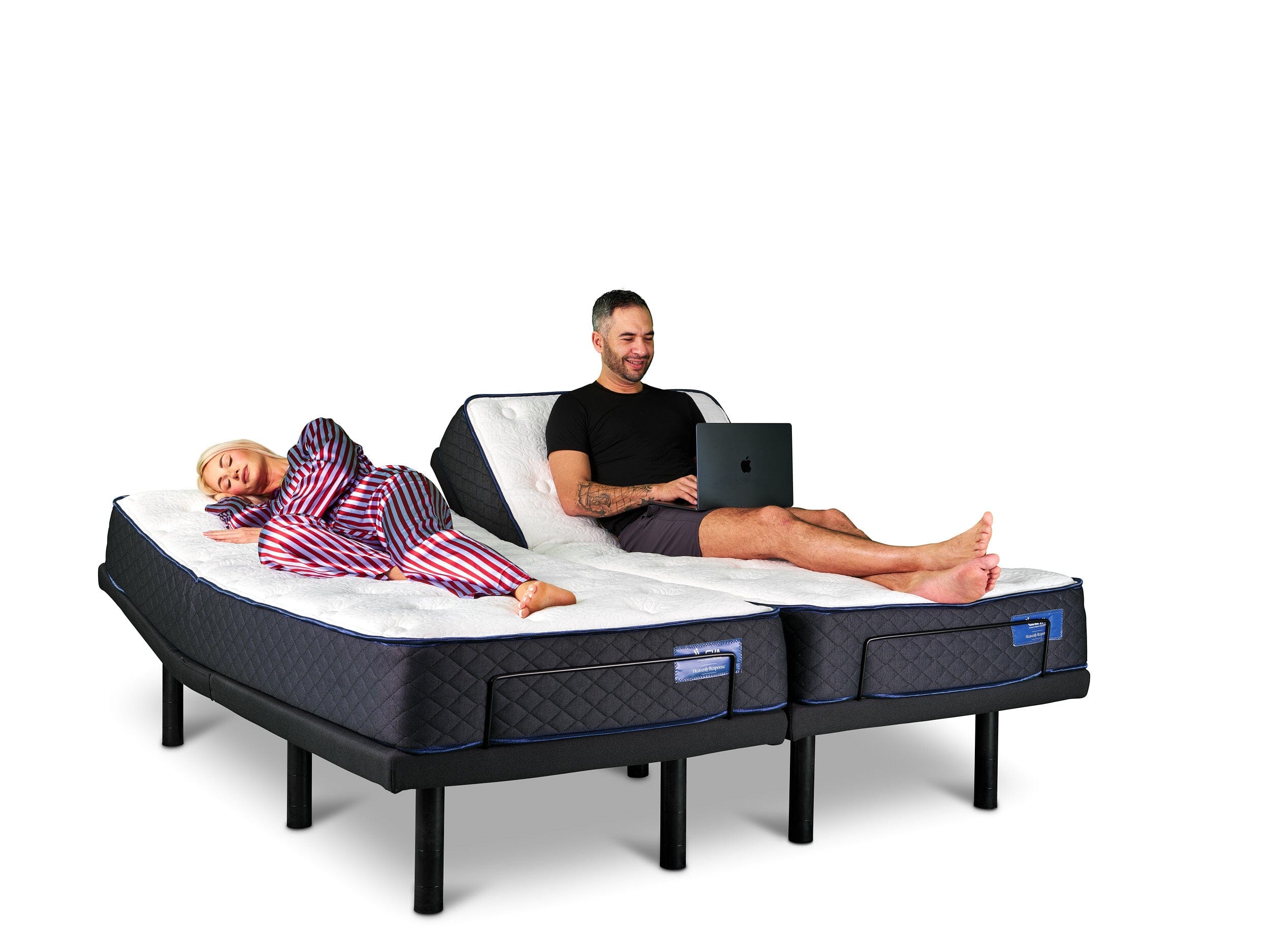Snoring can turn a shared bed into a source of frustration for many couples across Canada. If loud snores disrupt your sleep and strain your mornings, you’re not alone. Instead of resorting to separate bedrooms, natural solutions can help restore peaceful nights and happier days together.
This guide offers practical, natural ways to reduce snoring through lifestyle changes, sleep positioning, and modern tools like adjustable beds. You’ll find clear steps to improve your sleep environment and strengthen your bond by waking up rested, side by side.
Success starts with understanding why snoring happens and applying a mix of straightforward adjustments. Let’s explore how small changes in your routine and bedroom setup can lead to big improvements in sleep quality for both partners.
What Causes Snoring and Why It Affects Couples
Snoring happens when throat tissues relax during sleep, partially blocking the airway and causing vibrations. These vibrations create the familiar snoring sound, ranging from soft rumbles to loud disturbances. Air struggles to pass through a narrowed passage, much like wind making a flag flap more intensely in tight spaces.
Several factors can narrow airways. Excess weight around the neck adds pressure, while alcohol or lack of sleep relaxes throat muscles further. Physical traits, like a small chin or thick soft palate, can also play a role. Airway narrowing due to these factors increases snoring frequency and intensity.
For couples, snoring impacts both partners. The snorer often wakes briefly without realizing it, reducing sleep quality. The other partner faces interruptions from the noise, leading to tiredness and tension. Recognizing this shared challenge is the first step to finding solutions that benefit everyone.
Snoring varies in severity. It can be mild and harmless or a sign of serious issues like obstructive sleep apnea. This guide focuses on natural approaches for common snoring, while also noting when to seek medical advice.
Start with Lifestyle Changes to Reduce Snoring
Simple shifts in daily habits can lessen snoring by addressing factors that block airways. These adjustments take effort but often show improvement within a few weeks if maintained.
Control Weight for Better Breathing
Carrying extra weight, especially around the neck, presses on airways during sleep, worsening snoring. Losing even a small percentage of body weight can help. Aim for gradual, lasting changes by pairing balanced eating with regular activity. Exercise also tones muscles, including those that keep airways open. Consider working with a healthcare provider for a tailored plan.
Adjust Evening Routines
Your habits before bed matter. Drinking alcohol close to bedtime relaxes throat muscles too much, making airway collapse more likely. This relaxation significantly increases snoring risk. Skip alcohol at least three hours before sleep. If you take sedating medications, talk to a doctor about options that won’t affect breathing. Try calming herbal teas like chamomile instead for relaxation without the downside.
Clear Up Nasal Congestion
Blocked nasal passages force mouth breathing, which often leads to snoring. Reduce bedroom allergens like dust or pet dander by using hypoallergenic bedding and washing sheets in hot water weekly. Keep humidity at 40-50% and consider an air purifier. For allergies, nasal strips or saline rinses before bed can open airways naturally. Some find elevating their sleeping setup helps, which we’ll cover soon.
Build Better Sleep Habits
Not getting enough rest can make snoring worse. Fatigue leads to deeper sleep with more muscle relaxation, increasing snoring. Stick to a regular sleep schedule, aim for 7-9 hours nightly, and keep your bedroom cool and dark. Limiting screen time before bed also helps. Better rest reduces the body’s need for overly deep sleep that triggers snoring.
Try Sleep Positioning to Cut Down on Snoring
Changing how you sleep can quickly lessen snoring. For many couples, adjusting position is an easy, effective fix that reduces noise right away.
Avoid Sleeping on Your Back
Lying on your back lets gravity pull the tongue and throat tissues downward, narrowing the airway. This position often makes snoring louder and more frequent. Many slip back to this position during the night, so ongoing strategies are key.
Switch to Side Sleeping
Sleeping on your side keeps airways clearer by preventing tissue collapse. Use a body pillow to stay in position, or place one between your knees for comfort. Align your spine with the right head pillow. For stubborn back-sleepers, sew a tennis ball into the back of a pajama shirt to make rolling over less comfortable. It takes a few nights to adjust, but many adapt quickly. If side sleeping alone doesn’t fully help, more targeted positioning solutions can step in.
Use Adjustable Beds for Personalized Snoring Relief
Lifestyle tweaks and position changes offer a strong start, but modern sleep tools can boost results. Adjustable beds provide couples with tailored comfort, addressing snoring while keeping both partners happy in the same bed.
Discover Leva Sleep Adjustable Beds for Couples
Flat beds restrict positioning options, often forcing one partner to sacrifice comfort. Leva Sleep’s adjustable beds, like Split Queen and Split King models, allow each person to adjust their side independently while sharing a bed. Quiet motors and thoughtful design ensure movements don’t disturb the other sleeper.
Key Benefits of Leva Sleep for Snoring
- Head Elevation: A slight lift of the head can ease airway restriction. This adjustment reduces tissue vibration for quieter breathing. Precise controls help find the best angle.
- Anti-Snore Mode: This feature detects snoring and gently adjusts head position to lessen it, without waking either partner.
- Separate Controls: Each side adjusts independently, so one can elevate for snoring relief while the other stays flat, avoiding any compromise.
- Added Comfort: Features like pillow tilt, lumbar support, and massage options improve overall rest for both partners.
To start, elevate the snoring partner’s head by 10-15 degrees using the remote or app. Turn on anti-snore mode and track progress over a week, tweaking as needed. Many couples notice fewer disruptions and better mornings soon after. Ready to improve your nights? Explore Leva Sleep adjustable beds for a tailored sleep setup.
Extra Tips and When to Get Medical Help
Natural approaches and adjustable beds help many, but some cases need more support or professional input for lasting relief.
Enhance Positioning with Tools
Special pillows for head and neck alignment pair well with adjustable beds. Memory foam wedges or contoured options work with Leva’s tilt settings to keep airways open as you shift during sleep.
Stick with the Plan
Consistency matters. Lifestyle tweaks take 2-4 weeks to fully show benefits, while positioning and bed adjustments can offer quicker changes that improve over time. Keep a sleep log or use an app to track snoring patterns. Combining weight control, side sleeping, and technology often builds stronger results.
Know When to See a Specialist
If snoring remains loud or disrupts life despite changes, a doctor’s input may be needed. Severe snoring with fatigue or relationship strain calls for evaluation. Watch for signs like:
- Nightly loud snoring, no matter the position
- Gasping or breathing pauses during sleep
- Extreme tiredness despite enough hours in bed
- Morning headaches or dry mouth
- Partner noticing breathing stops
These could point to sleep apnea, needing medical care. Adjustable beds can still support prescribed positions alongside treatment.
How Leva Sleep Stands Out Against Other Beds
Choosing the right sleep setup matters for snoring relief. Here’s how options compare for couples:
|
Feature |
Flat Bed |
Basic Adjustable Bed |
Leva Sleep Adjustable Bed |
|
Snoring Approach |
Pillow tweaks, minimal impact |
Simple elevation, often manual |
Anti-Snore Mode, precise lift, app control |
|
Comfort for Two |
Shared motion, one-size-fits-all |
Limited separate control |
Split King/Queen, independent settings |
|
Motor Sound |
Not applicable |
Often loud or uneven |
Very quiet German motors |
|
Extra Features |
None |
Basic remote only |
App control, memory settings, massage |
Leva Sleep offers focused snoring relief and couple-friendly designs, unlike flat beds with no support or basic adjustables with limited function. Made with quality materials in Canada, these beds balance cost and value. See the difference: Check out Leva Sleep adjustable beds for snoring solutions.
Solving Common Snoring Challenges
Facing issues with snoring fixes? Here are practical answers.
- Feeling confined with head elevation? Start at 5-10 degrees and increase slowly. Use Leva’s pillow tilt for familiar comfort while gaining airway benefits.
- Snoring continues despite side sleeping and elevation? Turn on Leva’s anti-snore mode for automatic tweaks. Revisit habits like diet or alcohol intake.
- Non-snorer bothered by bed shifts? Opt for Leva’s Split Queen or King models. Quiet motors and separate bases limit motion transfer.
- Expecting instant results? Give it 1-2 weeks. Track trends instead of focusing on one night.
Common Questions About Snoring and Adjustable Beds
Do Adjustable Beds Help with Severe Snoring?
Head elevation in adjustable beds can ease snoring by opening airways. Leva Sleep’s Anti-Snore Mode adjusts automatically during snoring episodes. For severe cases with symptoms like breathing pauses or constant tiredness, see a doctor to check for sleep apnea. Adjustable beds can still assist alongside medical care.
Will an Adjustable Bed Disturb the Non-Snoring Partner?
Leva Sleep’s Split Queen and King beds allow separate adjustments. One side can shift for snoring relief while the other stays unchanged. Quiet motors and isolated bases keep movement and sound minimal, protecting your rest.
How Soon Can Snoring Improve with an Adjustable Bed?
Some notice less snoring from the first night with proper elevation. Leva’s Anti-Snore Mode works immediately, adjusting as needed. Fine-tuning over 1-2 weeks often brings the best outcome as you adapt to new positions.
Do Leva Sleep Beds Work with Any Mattress?
Leva bases pair with most mattresses, but flexible ones adjust better to movements. Older innerspring types may not flex well. For full snoring relief, use Leva’s compatible mattresses designed for dynamic positioning.
What If Snoring Persists Despite Natural Fixes?
If snoring stays loud after trying natural methods and bed adjustments, underlying issues like sleep apnea or a deviated septum might be the cause. Medical evaluation can help. Adjustable beds often remain useful for maintaining advised sleep setups during treatment.
Wrap-Up: Better Sleep for Couples with Leva Sleep
Cutting down on snoring naturally involves blending lifestyle habits, sleep positions, and tools like adjustable beds. With steps like weight control, allergy management, and Leva Sleep’s tailored features, couples can improve rest and connection.
Snoring solutions don’t mean sacrificing shared sleep. Leva Sleep’s Split Queen and King beds offer individual adjustments with Anti-Snore Mode, supporting both partners without compromise. Stick with changes for a couple of weeks to see steady progress.
Good sleep boosts mood, focus, health, and relationship quality. When both wake refreshed, daily life feels better. Want quieter nights together? Discover Leva Sleep adjustable beds and start improving your sleep now.

